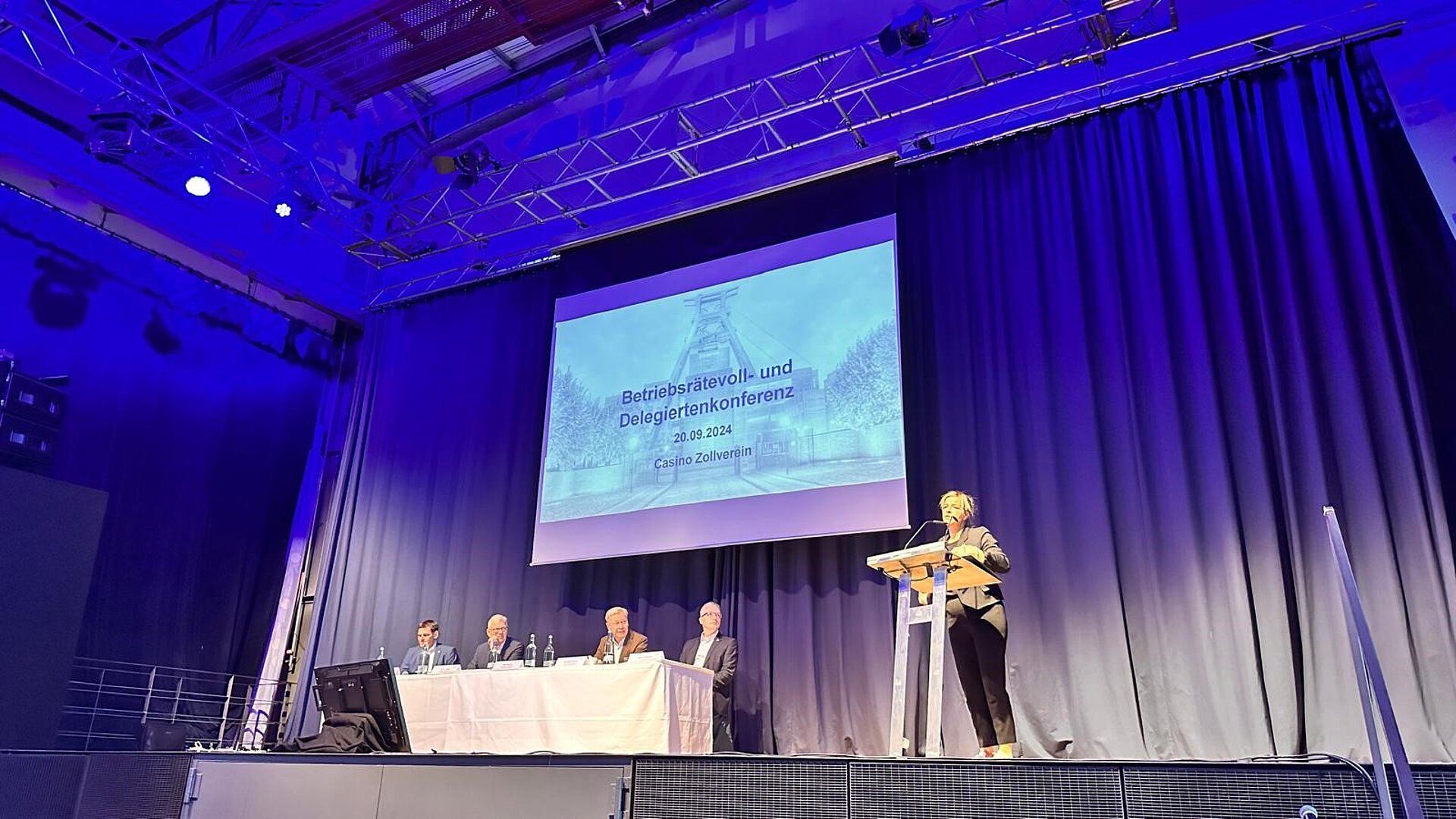Essen. On Friday, September 20, the members of the STEAG Group’s works councils met at the former Zollverein colliery in Essen. In addition to Gerhard Grabmeier, Chairman of the General Works Council, and the directors Dr. Andreas Reichel and Dr. Ralf Schiele, the North Rhine-Westphalian Minister of Economic Affairs and Deputy Minister-President, Mona Neubaur, delivered a speech as a guest of honor.
The venue for the conference, the Zollverein Coal Mine Industrial Complex, was a clever choice, as it was symbolic of the event: on the surface, Zollverein represents the Ruhr area’s mining and industrial past, but it has since become a symbol of the region’s successful structural transformation. Likewise, the STEAG Group has successfully broken new ground and implemented its own transformation after its strategic realignment at the beginning of 2023.
More renewables, hydrogen and new gas-fired power plants
In his report, Dr. Andreas Reichel, CEO and Labor Director of STEAG and Iqony, outlined the topics and projects on which the group will focus in the future in order to successfully position the company and the Group as a whole in the long term:
“We want to grow in the field of renewables by investing in our own generation capacities. We want to invest in battery electricity storage systems that make an important contribution to the success of the energy transition by improving the integration of energy from renewable sources in the grid and the market. We want to produce green hydrogen in the Ruhr and Saar regions, which will help regional industry to make its own processes and products climate-neutral. And we want to invest in new and, thanks to hydrogen, potentially climate-neutral gas-fired power plants that will enable us to ensure a secure and zero-emission energy supply in the future.”
Improved prospects for projects
The change of ownership at the turn of the year 2024 is also responsible for the STEAG Group’s opportunity to properly tackle these issues through its subsidiary Iqony. “While our previous owners lacked the financial strength to develop the company strategically and in a value-enhancing manner, the framework conditions have improved significantly under the new ownership of the Spanish infrastructure investor Asterion Industrial Partners,” said Gerhard Grabmeier, head of the General Works Council, in his introduction.
Important for the State
In her speech to around 120 employee representatives, Economics Minister Mona Neubaur also addressed these future prospects. With a view to forward-looking projects, the minister emphasized STEAG’s outstanding importance for a successful energy and heating transition, particularly in North Rhine-Westphalia:
“North Rhine-Westphalia has the ambition and the ability to become the first climate-neutral industrial region in Europe. This can only be achieved on the basis of a climate-neutral and competitive energy system. That is why we are focusing on hydrogen and doing everything we can to create the best possible conditions to make the development of the hydrogen economy in the Rhine and Ruhr regions a success. The projects that Iqony is preparing, particularly in the Ruhr area, are important building blocks in this process.”
Projects reflect the State government’s energy and heating strategy
In fact, there is a great deal of overlap between the recently presented energy and heating strategy of the state of North Rhine-Westphalia and the projects currently being undertaken by STEAG and Iqony: “In addition to the hydrogen and power plant topics, this applies in particular to district heating, where we are already working intensively in the Ruhr and Saar regions to make our heating climate-neutral. As a company, we want to become climate-neutral earlier than the targets set by the German government and the EU, i.e. by 2040,” says Andreas Reichel.
One possible contribution to achieving this goal while at the same time ensuring security of supply could be to convert STEAG’s last coal-fired power plant operating under market conditions. “The recently launched consultation procedure on the German government’s planned Power Plant Security Act (KWSG) has opened the debate on which power plants are suitable for such a fuel switch. Converting our Duisburg power plant Walsum 10 to natural gas and, in the future, hydrogen would be considerably cheaper than building completely new plants and would also contribute to the goal of an early phase-out of coal,” Andreas Reichel explains.
Iqony as enabler of the energy transition
Dr. Ralf Schiele, COO of STEAG and also CEO and COO of Iqony, also reported on a number of other projects that similarly correspond to the strategic focus of the state government. “We are investing in particular in the expansion of district heating and are consistently working on a decarbonized heat supply, for example with the district heating storage facility currently under construction in Gelsenkirchen. This also applies to the Saarland, where pioneering projects are currently being implemented in Völklingen-Fenne, Homburg and Camphausen.”
The in-house projects are complemented by several major collaborations with municipal partners who draw on Iqony’s expertise to implement their strategies and achieve climate targets: “This involves supporting the heating transition in several municipalities across Germany. Contracts to this effect have already been signed with Enwor, a local utility in Herzogenrath, North Rhine-Westphalia. We are in advanced talks with other municipal utilities,” says Ralf Schiele. In this respect, Iqony is in many ways an important enabler of the energy and heating transition in Germany.
Works Councils to provide constructive criticism
Speaking for the employee representatives, Gerhard Grabmeier made it clear that they fundamentally support the course the company has embarked on. “We also believe that the strategic goals have been set correctly. They open up prospects for the future and thus for job security for our colleagues. In this respect, we will gladly support the company on its further journey, but of course we will be particularly involved where this is necessary, given our role as representatives of the employees’ interests.”
